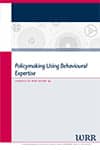A great deal of attention has focused in recent years on today’s behavioural economy and social psychology, and the contribution they can make to a government policy aimed at changing citizens’ behaviour.
'Nudging'
Several government ministries have enthusiastically embraced this new knowledge, and ‘nudging’ has become a commonplace term. The WRR has made a considerable contribution to this interest, among other things through its 2009 Investigation ‘The human decision-maker’ (De menselijke beslisser). In recent years, the British Behavioural Insights Team has been attracting particular international attention, recording a number of remarkable successes in the application of this new knowledge. Sporadic voices are now being heard asking whether the Netherlands should also set up a similar institution.
Where do we go from here?
The WRR will publish a concise advisory report on this and related questions. Five years after the first WRR publication on this topic, it is time to take stock. Where do we stand today? A great deal has been said about this topic in recent years, numerous practical initiatives have been developed, and a series of advisory bodies in the Netherlands and abroad have published reports on the topic. What can we learn from them? And above all: where do we go from here? How can the government ensure that the new knowledge of behavioural science acquires the position in the making and implementation of policy that it deserves?
Publication
On the 10th of September 2014, the WRR presented the report Met kennis van gedrag beleid maken (Policymaking Using behavioural Expertise).

Image: © WRR
Policymaking Using Behavioural Expertise (English summary of WRR-report no. 92)
Policymaking could improve if greater use were made of the knowledge contributed by behavioural economics and psychology. The behavioural sciences should therefore be embedded more deeply in the policymaking process, for example by establishing a basic capacity internally in each ministry.
News
Government reaction to WRR report ‘Behavioural insights in policymaking’
On 4 December 2014 the Dutch Minister of Economic Affairs, Henk Kamp, set out the government’s reaction to a series of advisory ...
Read morePolicymaking using behavioural expertise
In 2009, the Netherlands Scientific Council for Government Policy (WRR) published its investigation The Human Decider (De ...
Read more
